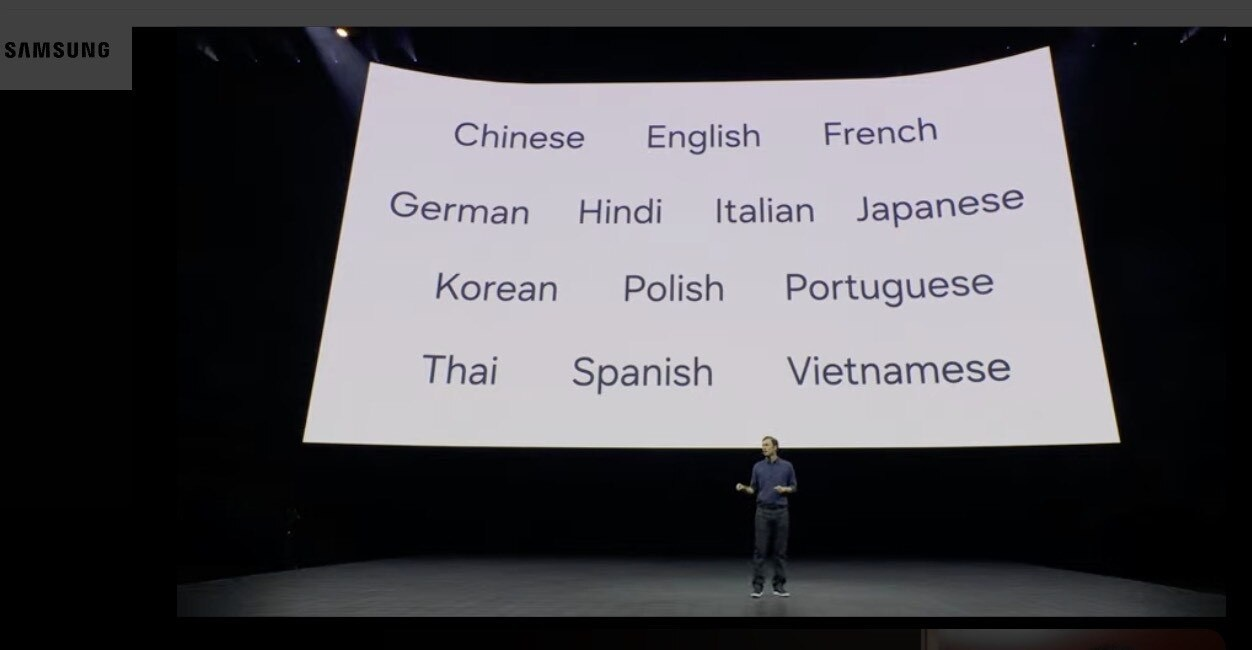
“The moment we saw Vietnamese standing alongside other languages at the launch of Galaxy AI, we were overwhelmed with emotion,” recalled Tuan Minh, one of the engineers responsible for integrating Vietnamese into Galaxy AI.
The journey to bring Vietnamese to Galaxy AI
Samsung introduced Galaxy AI in January 2024 alongside the Galaxy S24 series. Four months prior, in October 2023, Samsung decided to make Vietnamese the 13th language supported on Galaxy AI and entrusted the Samsung Research and Development Center in Vietnam (SRV) with this critical task.
The decision to include Vietnamese among the initial 13 languages underscores Vietnam's significant role in Samsung’s global operations - not only as a key market but also as a major manufacturing hub, producing nearly all Samsung devices sold in Europe.
However, developing AI support for Vietnamese was no easy feat. The language’s unique characteristics - regional dialects, six distinct tones, numerous reduplicative words, homonyms, borrowed words, and evolving slang, particularly among Gen Z - posed substantial challenges for the SRV team.
“We had to constantly gather new words and refine our data to keep up with online trends,” Minh explained.
The team focused on data processing, ensuring that the input data met three critical criteria: it had to be extensive, diverse, and accurate. In the early stages, when data was insufficient, hundreds of engineers were mobilized to refine and expand the dataset. To enhance accuracy, SRV also collaborated with two leading Vietnamese language institutions: the University of Languages and International Studies and the University of Social Sciences and Humanities.
Samsung implemented a dual-layer testing process to improve AI precision - automated testing to evaluate hundreds of thousands of cases rapidly and human testing to ensure the highest accuracy. For example, speech-to-text conversion had to achieve at least 95% accuracy, while text-to-speech conversion needed to be at least 90% accurate.
From one-way interaction to human-like AI
According to Minh’s colleague, Anh Quan, Samsung’s vision of “Galaxy AI for all” has driven its efforts to make AI-powered mobile experiences more accessible. Currently, around 93% of Galaxy S24 users in Vietnam actively use Galaxy AI, a milestone that SRV takes great pride in achieving.
From the Galaxy S24 to the upcoming Galaxy S25, Galaxy AI has evolved from basic one-way interactions to more advanced, human-like AI capabilities. Users can now perform complex tasks through voice commands, such as searching for a specific photo and sending it to a friend.
Human-like AI focuses on three core elements: natural and intuitive interaction, deep personalization, and robust security.
To ensure data security, Samsung has implemented stringent protocols from the outset. All collected data is legally vetted and free from ethical concerns. The AI’s output is rigorously screened to prevent biases or harmful consequences for users. Additionally, Samsung’s Knox security platform safeguards all data stored on its devices.
A dedicated control panel allows users to see exactly which features are utilizing their data. They also have the option to withhold their data from cloud-based AI functions, providing greater peace of mind when using Galaxy AI.
As an open platform, Galaxy AI will continue integrating various AI solutions to better serve users in different contexts. In 2023 alone, approximately 200 million Samsung devices - ranging from smartphones to other ecosystem products - were equipped with Galaxy AI.
While no AI system on the market is flawless, including Galaxy AI, its capabilities will improve with increased usage. Like other AI-driven tools, the more it is used, the smarter it becomes.
Du Lam